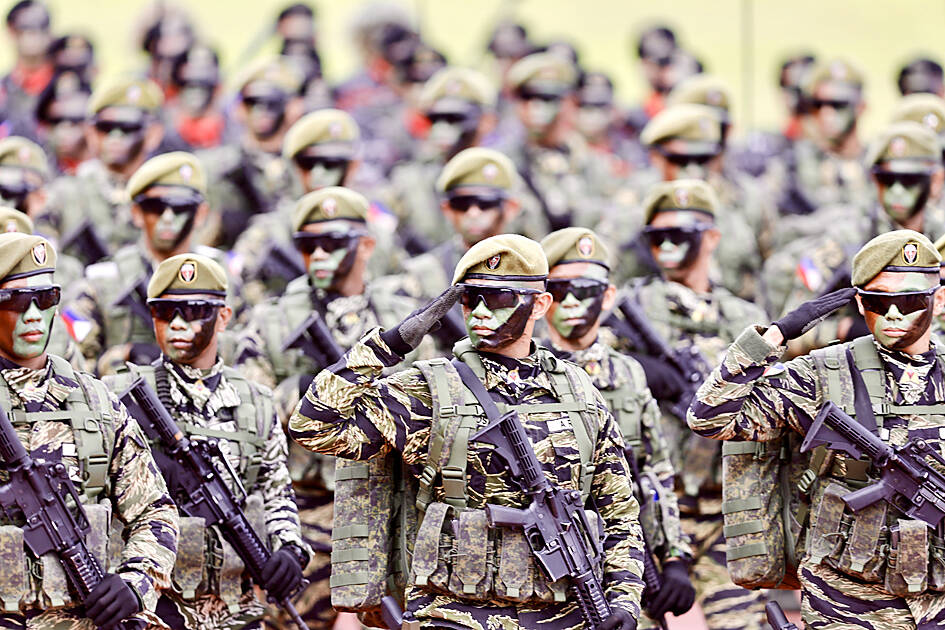The Philippines and New Zealand have begun negotiating an agreement that would allow them to deploy troops on each other’s soil, the two countries said yesterday, as concerns over maritime tensions with China grow.
Manila has been seeking to boost defense ties in the Asia-Pacific region and beyond in the face of China’s growing confidence in asserting its claims over the hot spot South China Sea.
A first round of talks was held in Manila on Thursday last week between the Philippines and New Zealand’s defense departments, they said in a joint statement.

Photo: EPA-EFE
“The first round of negotiations marked an important step in strengthening bilateral defense ties between the Philippines and New Zealand,” it said.
The Status of Visiting Forces Agreement would provide the legal framework for the countries “to elevate their cooperative activities and conduct exercises in each other’s territories, deepening overall defense and military cooperation,” it said.
New Zealand Ambassador to the Philippines Catherine McIntosh attended the Manila meeting, while other members of Wellington’s delegation participated virtually.
From the Philippines’ side, negotiators included officials from the departments of defense, justice and foreign affairs, as well as the Presidential Commission on Visiting Forces.
Last month, the Philippine Senate ratified the same defense agreement with Japan. The Southeast Asian country has also signed similar defense pacts with the US and Australia, and has begun talks with France.
Beijing claims almost the entire South China Sea, brushing aside competing claims from several nations in the region, including Taiwan and the Philippines, and an international ruling that its stance has no legal basis.
There have been frequent clashes or tense standoffs between Philippine and Chinese vessels in the strategic waterway.

INVESTIGATION: The case is the latest instance of a DPP figure being implicated in an espionage network accused of allegedly leaking information to Chinese intelligence Democratic Progressive Party (DPP) member Ho Jen-chieh (何仁傑) was detained and held incommunicado yesterday on suspicion of spying for China during his tenure as assistant to then-minister of foreign affairs Joseph Wu (吳釗燮). The Taipei District Prosecutors’ Office said Ho was implicated during its investigation into alleged spying activities by former Presidential Office consultant Wu Shang-yu (吳尚雨). Prosecutors said there is reason to believe Ho breached the National Security Act (國家安全法) by leaking classified Ministry of Foreign Affairs information to Chinese intelligence. Following interrogation, prosecutors petitioned the Taipei District Court to detain Ho, citing concerns over potential collusion or tampering of evidence. The

‘FORM OF PROTEST’: The German Institute Taipei said it was ‘shocked’ to see Nazi symbolism used in connection with political aims as it condemned the incident Sung Chien-liang (宋建樑), who led efforts to recall Democratic Progressive Party (DPP) Legislator Lee Kun-cheng (李坤城), was released on bail of NT$80,000 yesterday amid an outcry over a Nazi armband he wore to questioning the night before. Sung arrived at the New Taipei City District Prosecutors’ Office for questioning in a recall petition forgery case on Tuesday night wearing a red armband bearing a swastika, carrying a copy of Adolf Hitler’s Mein Kampf and giving a Nazi salute. Sung left the building at 1:15am without the armband and apparently covering the book with a coat. This is a serious international scandal and Chinese

Seventy percent of middle and elementary schools now conduct English classes entirely in English, the Ministry of Education said, as it encourages schools nationwide to adopt this practice Minister of Education (MOE) Cheng Ying-yao (鄭英耀) is scheduled to present a report on the government’s bilingual education policy to the Legislative Yuan’s Education and Culture Committee today. The report would outline strategies aimed at expanding access to education, reducing regional disparities and improving talent cultivation. Implementation of bilingual education policies has varied across local governments, occasionally drawing public criticism. For example, some schools have required teachers of non-English subjects to pass English proficiency

TRADE: The premier pledged safeguards on ‘Made in Taiwan’ labeling, anti-dumping measures and stricter export controls to strengthen its position in trade talks Products labeled “made in Taiwan” must be genuinely made in Taiwan, Premier Cho Jung-tai (卓榮泰) said yesterday, vowing to enforce strict safeguards against “origin laundering” and initiate anti-dumping investigations to prevent China dumping its products in Taiwan. Cho made the remarks in a discussion session with representatives from industries in Kaohsiung. In response to the US government’s recent announcement of “reciprocal” tariffs on its trading partners, President William Lai (賴清德) and Cho last week began a series of consultations with industry leaders nationwide to gather feedback and address concerns. Taiwanese and US officials held a videoconference on Friday evening to discuss the